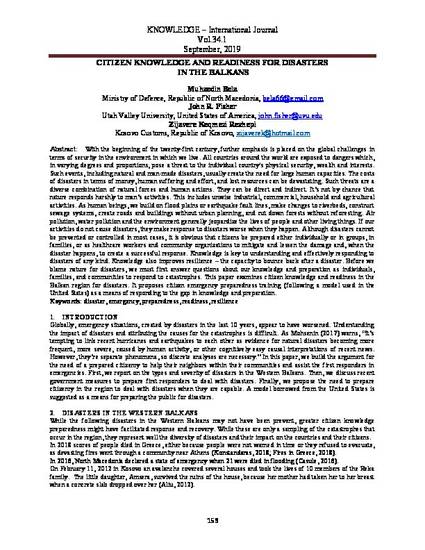
Article
Citizen knowledge and readiness in the Balkans
KNOWLEDGE - International Journal
(2019)
Abstract
With the beginning of the twenty-first century, further emphasis is placed on the global challenges in terms of security in the environment in which we live. All countries around the world are exposed to dangers which, in varying degrees and proportions, pose a threat to the individual country's physical security, wealth and interests. Such events, including natural and man-made disasters, usually create the need for large human capacities. The costs of disasters in terms of money, human suffering and effort, and lost resources can be devastating. Such threats are a diverse combination of natural forces and human actions. They can be direct and indirect. It’s not by chance that nature responds harshly to man’s activities. This includes unwise industrial, commercial, household and agricultural activities. As human beings, we build on flood plains or earthquake fault lines, make changes to riverbeds, construct sewage systems, create roads and buildings without urban planning, and cut down forests without reforesting. Air pollution, water pollution and the environment generally jeopardize the lives of people and other living things. If our activities do not cause disasters, they make response to disasters worse when they happen. Although disasters cannot be prevented or controlled in most cases, it is obvious that citizens be prepared either individually or in groups, in families, or as healthcare workers and community organizations to mitigate and lessen the damage and, when the disaster happens, to create a successful response. Knowledge is key to understanding and effectively responding to disasters of any kind. Knowledge also improves resilience – the capacity to bounce back after a disaster. Before we blame nature for disasters, we must first answer questions about our knowledge and preparation as individuals, families, and communities to respond to catastrophes. This paper examines citizen knowledge and readiness in the Balkan region for disasters. It proposes citizen emergency preparedness training (following a model used in the United States) as a means of responding to the gap in knowledge and preparation.
Keywords
- disaster,
- emergency,
- preparedness,
- readiness,
- resilience,
- Balkans,
- CERT
Disciplines
Publication Date
September, 2019
Publisher Statement
Each paper is reviewed by the editor and, if it is judged suitable for this publication, it is then sent to two referees for double blind peer review.
Citation Information
Bela, M., Fisher, J.R., & Keqmezi Rexhepi, Z. (2019) Citizen knowledge and readiness for disasters in the Balkans. KNOWLEDGE - International Journal, 34:1 (159-163).
